1977-1982 – Under the Direction of David Robert Kanter as Players State Theater
The Players Repertory Theater started in 1968 as a non-profit regional theater company at the small Gaslight Theater in the Grove. In 1970, after developing a strong local following, the company moved to a 300-seat space at the Museum of Science. Miami theater goers supported the company and felt connected to it, evidenced by their financial support when there were shortfalls. The community was generous and the shows went on against all odds.
In November, 1976 the company’s founder, Dan Duckworth, left. And in January of 1977, the company hit bottom. They had no money and shut down.
However, their enthusiastic and dedicated board president, Tom Spencer, saved the season. He was a relentless fundraiser. With wide radio, TV, and press coverage he raised, within a month, about $50,000–the money needed to continue the season.
Most important, though, this widespread publicity reached the managing director of Florida’s Asolo Theater in Sarasota, Florida’s official—and, since 1965, its only–State theater. Howard Millman approached Spencer, explained his thoughts about expanding the State theater system, and suggested that Player’s Repertory might consider becoming the second State theater.
At about the same time, Fishko put up for sale the Coconut Grove Playhouse. For the Players, their moving to a substantial facility like that could be a help in persuading the State to take them on. Although State funding wouldn’t be all that would be needed, it could cover the mortgage payments.
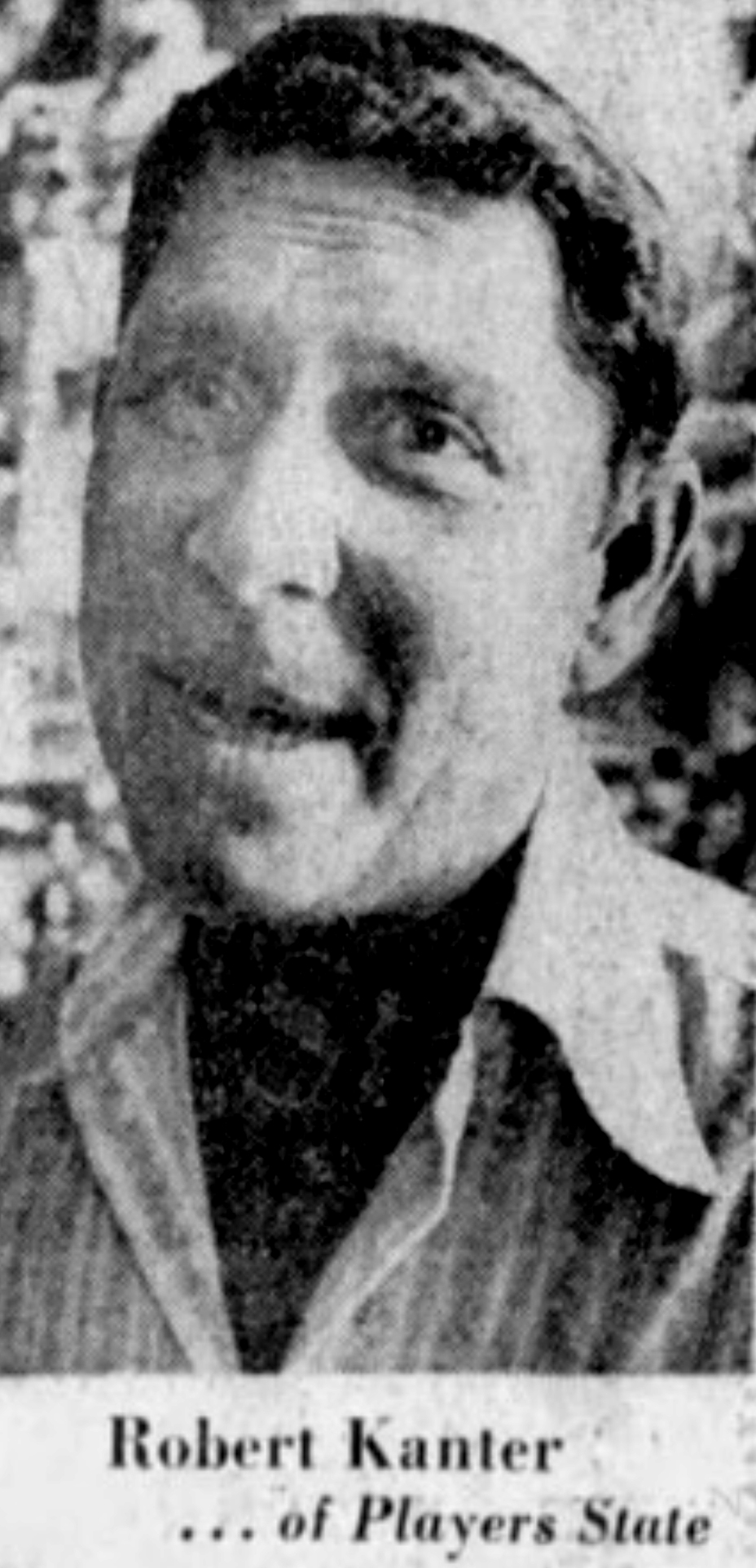
David Robert Kanter. Excerpted from Miami Herald, June 25, 1978.

“Reception for bigtime contributors and friends” in November 1977 celebrates Players State’s fundraising success. Excerpted from Miami Herald November 2, 1977.
So, while still continuing productions at the museum with an interim director and working to secure State backing, Players undertook even more intensive fundraising. It established a significant Founders group (at $1000 per couple) and landed substantial donations from business interests—the largest of which came from the Knight Foundation.
They formed a large new board consisting of those generous founders who also had experience that would be useful to the theater. They gained the support of the State, with several requirements: they had to submit to the state their budget as well as their intended plays, they had to establish a strong educational program, and they had to hire a new director who the State would approve.
Players conducted a nation-wide search for a director—seeking a person with substantial experience in both the theater and, crucially, in the business of operating a theater. They hired David Robert Kanter, who had most recently run a successful regional theater in Michigan, to serve as both artistic and managing director and he started work in August 1977.
Kanter’s first play was “Cyrano de Bergerac. “Like his predecessor Robert Fishko, he felt that it was important to present plays with modern themes that would not just be entertainment, but thought provoking for audiences. Unlike in earlier years, big-name stars only occasionally appeared. Kanter presented shows included “Streamers” (a violent anti-Vietnam play), “Ceremonies in Dark Old Men “(about the black experience), “Shadow Box” (about three people dying of cancer), “Getting Out” (about an ex-convict’s difficult life after prison), and a production of “Oedipus Rex”—with an all-black cast.
A notable success of The Players during this era, however, was that in 1979 the State agreed to purchase the Coconut Grove Playhouse building from them. This reduced the previously always-present financial stress and is what ultimately ensured that the theater would continue for 25 more years. That same year, the board split Kanter’s two roles: He continued to be the artistic director, directing many of the shows himself, and David Black was hired as managing director.
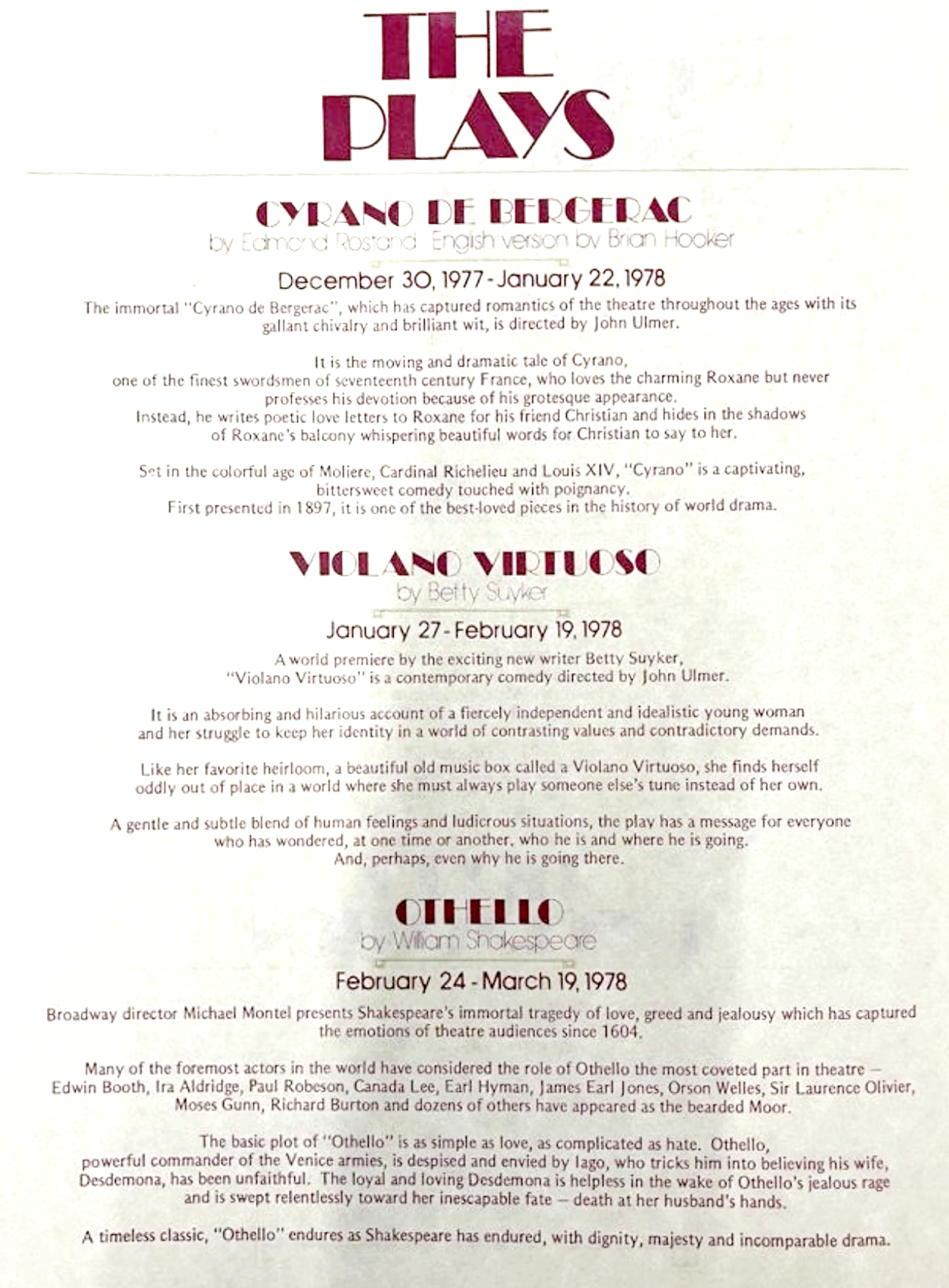
Sketch of the Coconut Grove Playhouse, on the program of the opening production in 1956.
David Robert Kanter headed productions at the Playhouse for five years, but in September of 1982 he resigned. The Miami News called his departure “abrupt,” saying that some board members disagreed with Kanter’s vision of the Playhouse as a venue for new and experimental plays. The Miami Herald’s coverage, however, described it as “amicable,” one that was mutually decided with the Players’ board.
During Kanter’s time at The State Theater at Coconut Grove Playhouse revenues increased substantially, with ticket sales and subscriptions both increasing three-fold. Nonetheless, well before Kanter announced his departure there was a sense that change was needed: Four months before, in May of 1982, an article by the Miami Herald theater critic Christine Arnold was headlined: “After five seasons, Players has the need for new direction, identity.”
1983-1985 – Under the Direction of Jose Ferrer
In December of 1982 Dr. Phillip George, president of the Players Board, made an announcement. Jose Ferrer, who had recently played the lead in “The Dresser” there, had agreed to take on the role of artistic director at Players State Theatre—for an annual salary of $1. He told Christine Arnold of The Miami Herald:
Calling me artistic ‘adviser’ is a more diplomatic and useful description. If I were artistic director, I would feel honor-bound to be here at all times. I don’t intend to abandon my own career, and at $1 a year, I can do an occasional film.
In December of 1982 Dr. Phillip George, president of the Players Board, made an announcement. Jose Ferrer, who had recently played the lead in “The Dresser” there, had agreed to take on the role of artistic director at Players State Theatre—for an annual salary of $1. He told Christine Arnold of The Miami Herald:
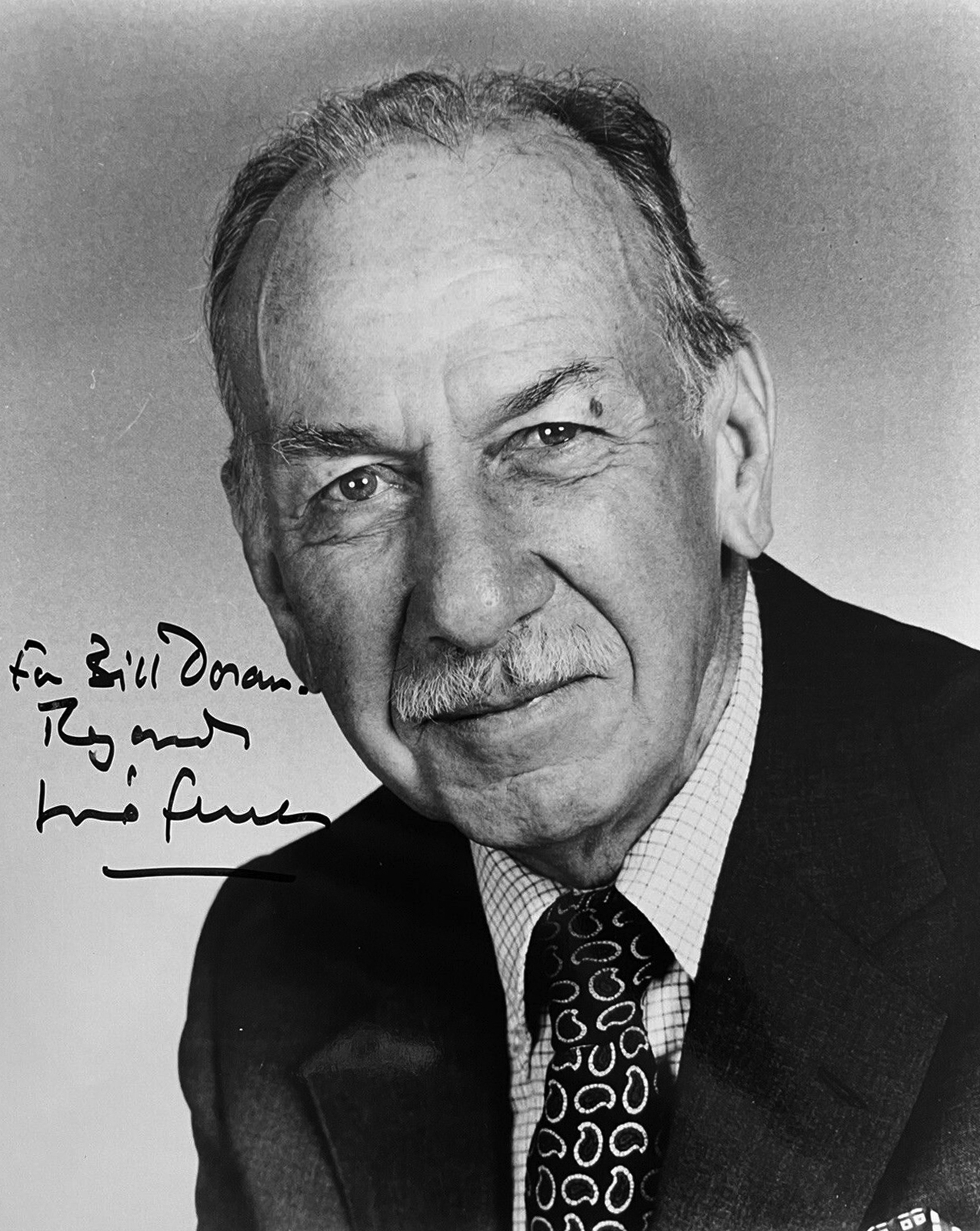
Jose Ferrer.
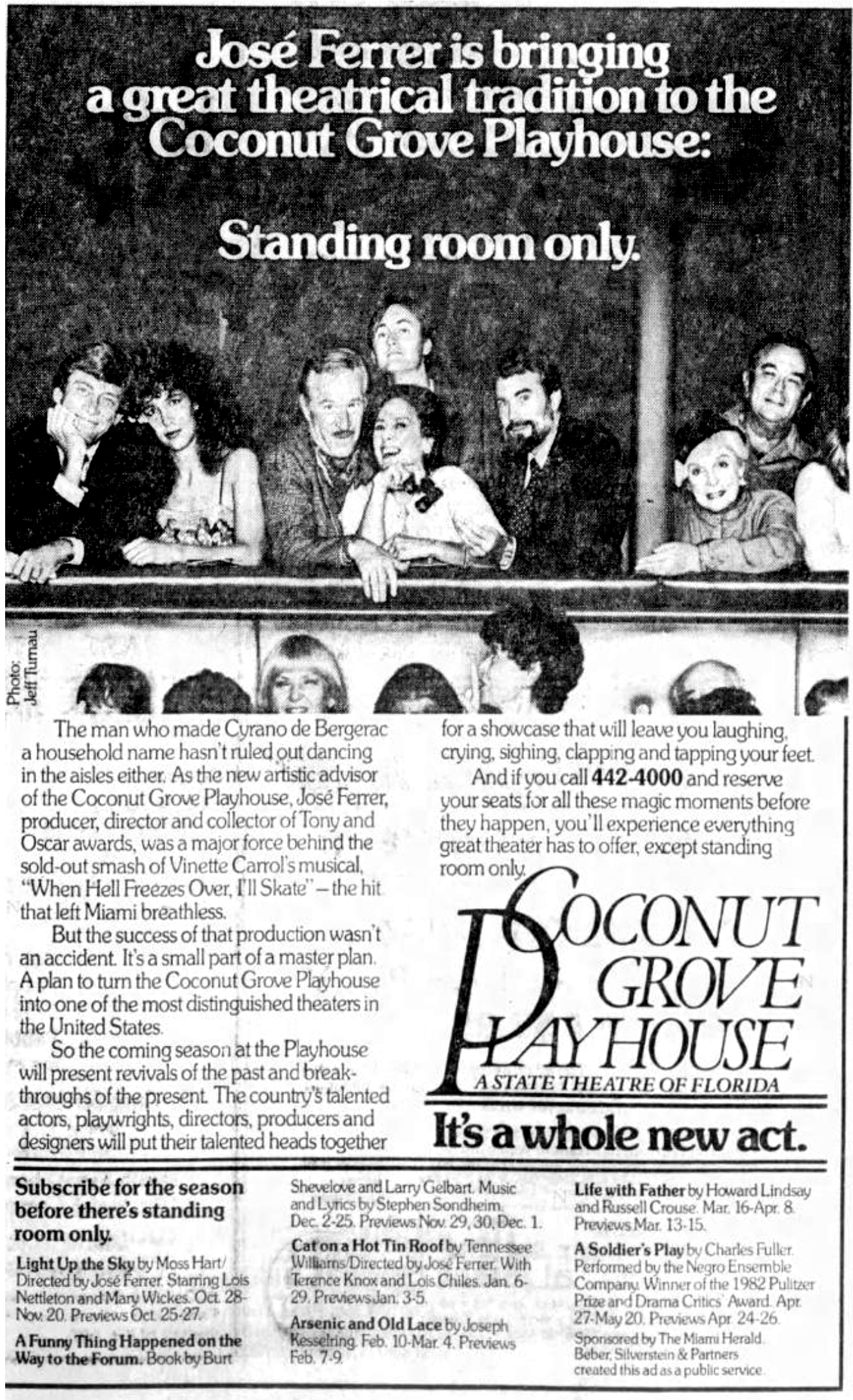
Jose Ferrer’s fame was used to market what the Board anticipated would be a new era for the Playhouse.
Ferrer believed that big names were important to attract audiences, and he drew several (including Kim Hunter, Danny Aiello, Elaine Stritch) to the CGP stage during his two years there. He also believed that presenting American classics—like Moss Hart’s “Light Up the Sky”—was important in attracting and sustaining audiences.
Further, he thought he could attract new theater-goers by presenting Spanish language productions. He was credited as being the first to bring these to a large Miami theater. In November 1984 he presented two versions of “The Glass Menagerie,” one in Spanish and one in English.
While under Ferrer’s guidance the Playhouse presented impressive work, including: “A Coupla’ White Chicks Sitting Around Talking,” “A Destiny with Half Moon Street,” Vinnette Carroll’s “When Hell Freezes Over I’ll Skate,” “A Soldier’s Play,” and “When You Comin’ Back Red Ryder.”
Ferrer very generously gave his expertise and energy to the Playhouse, but this did not temper how the press wrote about him. He was harshly criticized for hiring his sons to work on plays. He resigned on January 4, 1985, telling The Miami Herald:
Attendance and subscriptions have not increased to put it kindly, and overall, my work has not met with the approval of the press. Clearly, it is time for someone better qualified to take the reins.
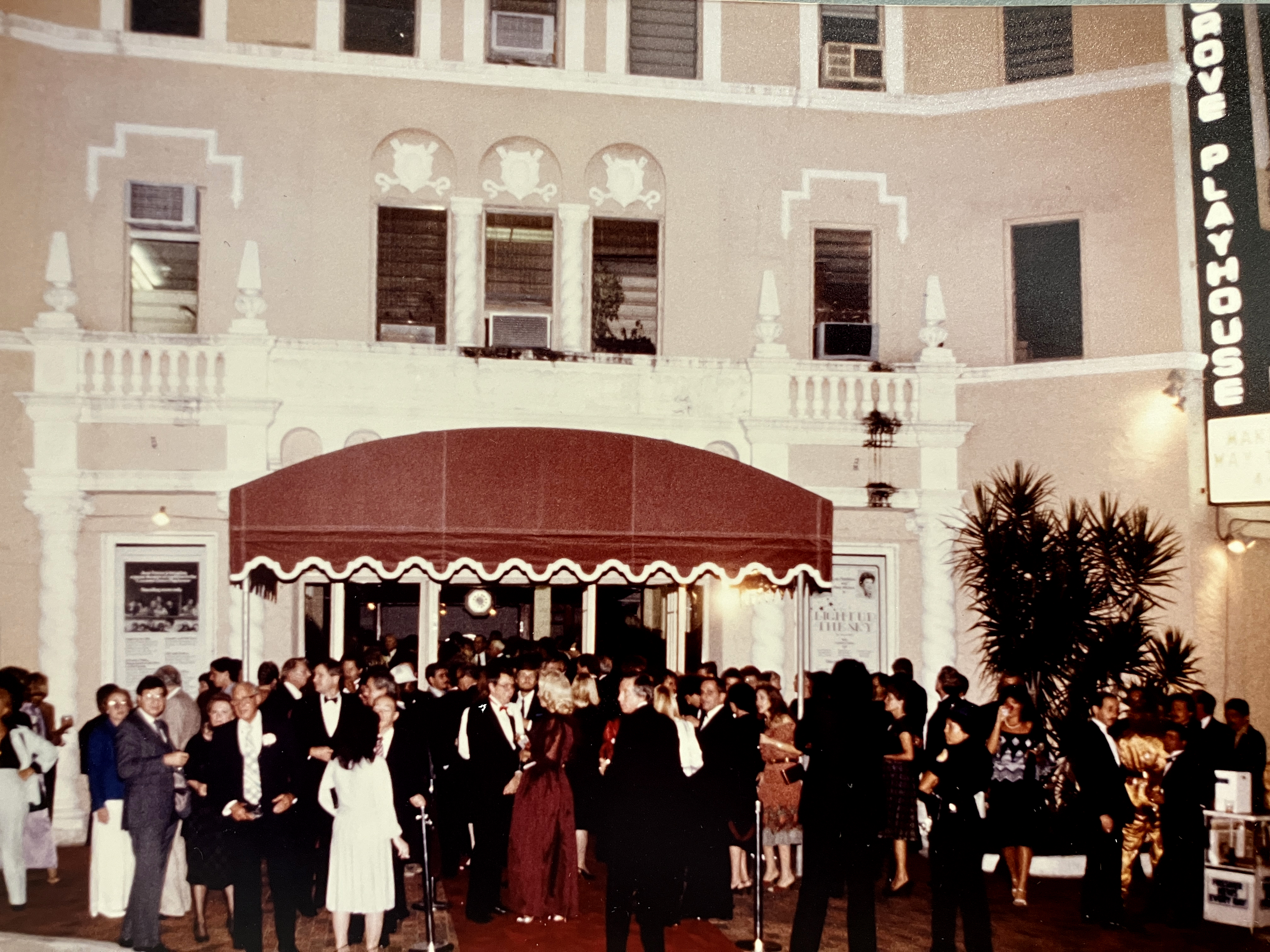
Crowd outside the theater, likely during the 1983-1984 season. The poster in the display window advertises “Light Up the Sky.”
Later, the Herald described the situation even more succinctly, writing that Ferrer “quit his dollar-a-year job, having found that it came with at least $1 million worth of stress.”
Several months earlier, Ferrer had suggested a promising management candidate to the Board, a young and heralded theater director and producer from New York and New Jersey with strong business skills and experience. Arnold Mittelman had been a founding director of the acclaimed New York Free Theater and Whole Theater Company. He also had produced and directed on Broadway Though it conducted a national search, the Board decided to hire his recommendation.
Arnold Mittelman on Jose Ferrer
The Board also hired Mittelman’s wife, Judith Delgado, actress and colleague at New York Free Theater and Whole Theater Company, to head up the theater’s Education Department. This is an important aspect of a “State Theater.” Ferrer stayed on in the winter of 1985, working through the transition to the new producing artistic director, Arnold Mittelman.

The Playhouse honored Jose Ferrer when he died in 1992, seven years after he resigned as the director of the Playhouse.
1985-2006 – Under the Direction of Arnold Mittelman
Having never been to Miami before accepting the job, Mittelman, Judith Delgado, and their daughter Justine (just about to enter high school) packed up their lives and went to Coconut Grove. He immediately began work as Producing Artistic Director of the Coconut Grove Playhouse…and did that for 21 years, longer by far than any previous Playhouse director.
Mittelman’s title, “Producing Artistic Director,” meant that he was hired to do everything—the artistic direction of the theater and, importantly, the business side. Listen to his reflections on those 21 years .
Arnold Mittelman on 21 Years at the Coconut Grove Playhouse
Some months later, the Miami Herald wrote about him, noting that although, historically, artistic directors at the Playhouse had short tenures, Mittelman arrived with a different intention:

Arnold Mittleman
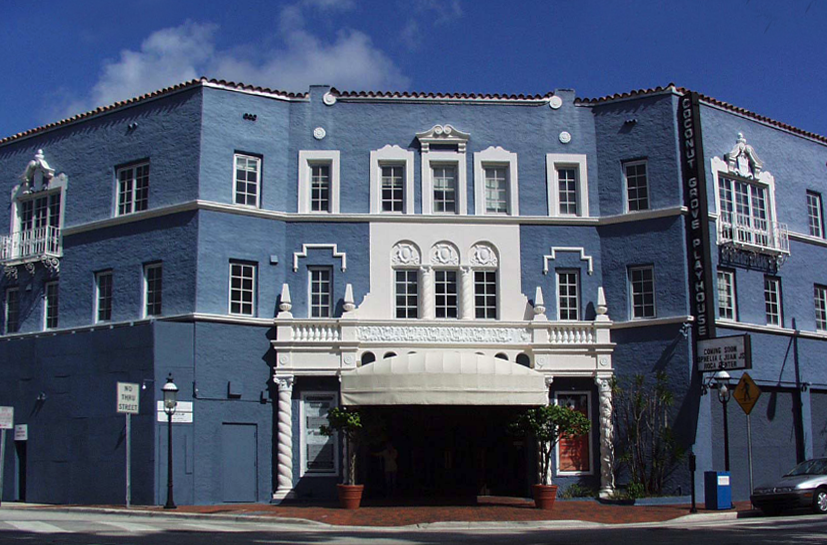
Besides adding the new Encore Room, Mittelman made it clear in many ways that he was making major changes to the Playhouse. Just another example: In the late 1980s, he changed the color of the Playhouse’s exterior from its drab sienna/pink to a vibrant blue.
I really didn’t think that I was going to come here to come and go. That’s what people tell you, though, you have to do in Miami. They say to me, ‘Arnold, to stay sane around here you better just think of it as a place you’re just coming through.’
Mittelman certainly did not “come and go.” Listen to Mittelman describing the elements that contributed to his longevity.
Arnold Mittelman on the Secret Sauce
Unlike his predecessors, he had artistic capabilities and major not-for-profit theater management and fund-raising talents. He hit the ground running and, for over two decades, was responsible for more than 200 plays, musicals, educational, and special events performed on two stages (1100 and 200 seats). The 200-seat Encore Room Theater was added by Mittelman and conceived of as an Off-Broadway stage to complement the 1100-seat main auditorium. On both stages, ethnically diverse plays and musicals, world premieres, many of which he directed himself–were seen by over three million attendees, including countless disadvantaged citizens, seniors, and students.
Mittelman recognized what some of his predecessors, most notably Jose Ferrer, had worked to do in providing programming that reflected and attracted Miami’s diverse community. Seeing that they had occasionally presented works in both Spanish and English, he continued to do this. Further, he worked with talented Latino playwrights including noted Cuban-American writers like Luis Santeiro and Nilo Cruz, often staging their plays for the first time. Each year (with rare exception) saw at least one production that addressed Latino interests. These included about 30 offerings, including “Rum and Coke” (early in Mittelman’s tenure in 1985), “Mixed Blessings” (1989), “Falling Fidel” (1994), “Goodbye, My Friduchita” (1996), to “Sonia Flew” (2006).
In addition to these productions he also worked with several playwrights in developing their new work. The Playhouse presented staged readings of several works, including:
- “Ybor City Trilogy,” Jose Yglesias’ telling of the rich culture of Tampa’s Ybor City, known for its cigar-making industry
- “Madman of the Balconies,” Mario Vargas Llosa’s play about a professor who, in his old age, has taken on the mission of protecting Lima’s carved colonial balconies from the threat of developers. Jose Ferrer starred.
- “Carmen Libre,” Eduardo Gallardo’s musical reimagining of Bizet’s opera set in revolutionary Cuba, with Carmen as a revolutionary working to overthrow Castro.
Similarly, during Mittelman’s years at the Playhouse, he staged more than 15 plays that portrayed African Americans, including “Home” (1985), “Golden Boy” (1989), “Sweet and Hot” (1993), “Having Our Say” (1997), “Blue” (2002), “Cookin’ at the Cookery: The Music and Times of Alberta Hunter” (2004).
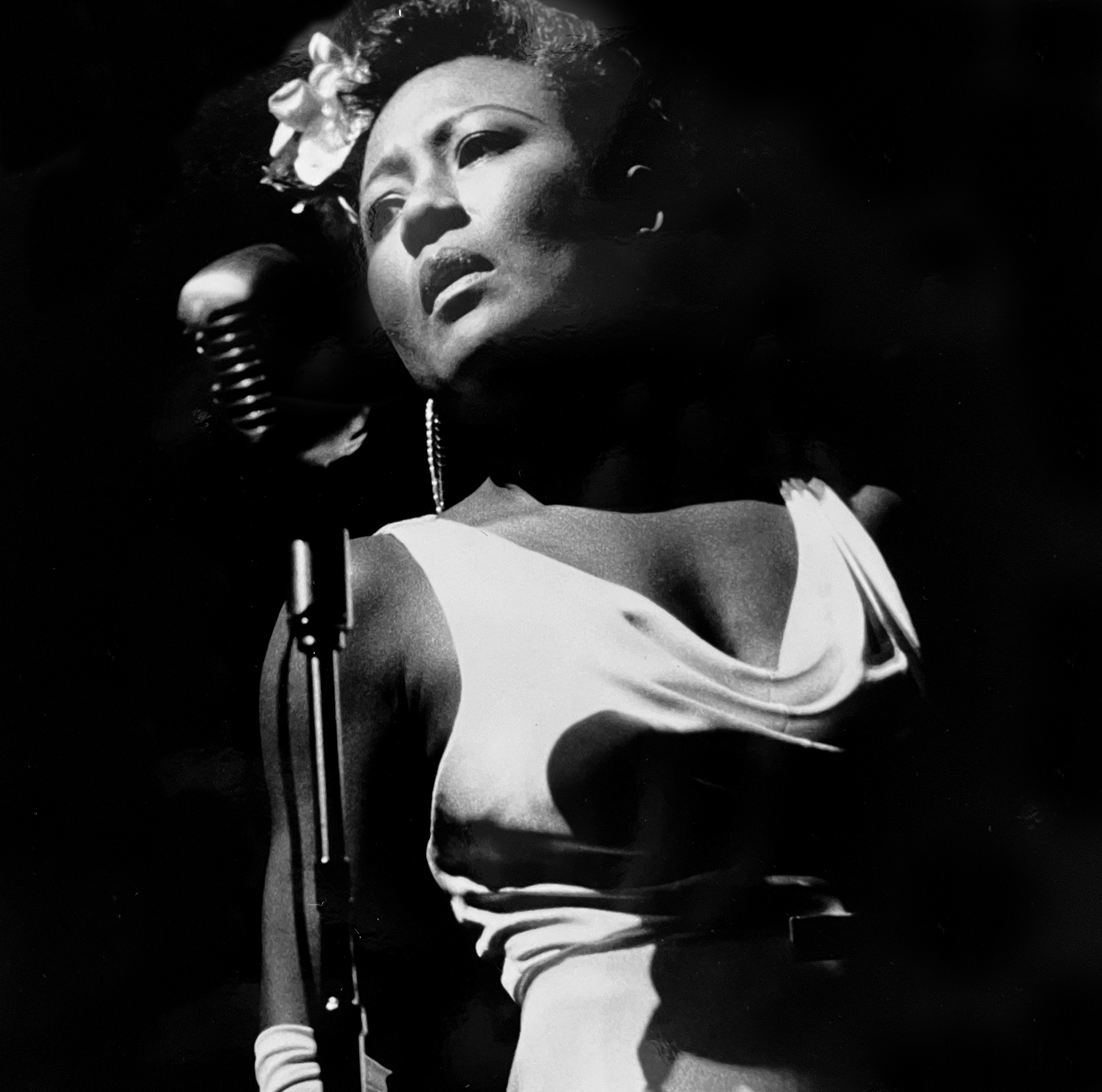
In 1989 Ernestine Jackson starred in “Lady Day at Emerson’s Bar and Grill,” honoring the life and songs of Billie Holiday. This play, directed by Mittelman, was one of the many Playhouse productions that went on to other cities, in this case later in 1989 to Chicago’s Wisdom Bridge Theatre.
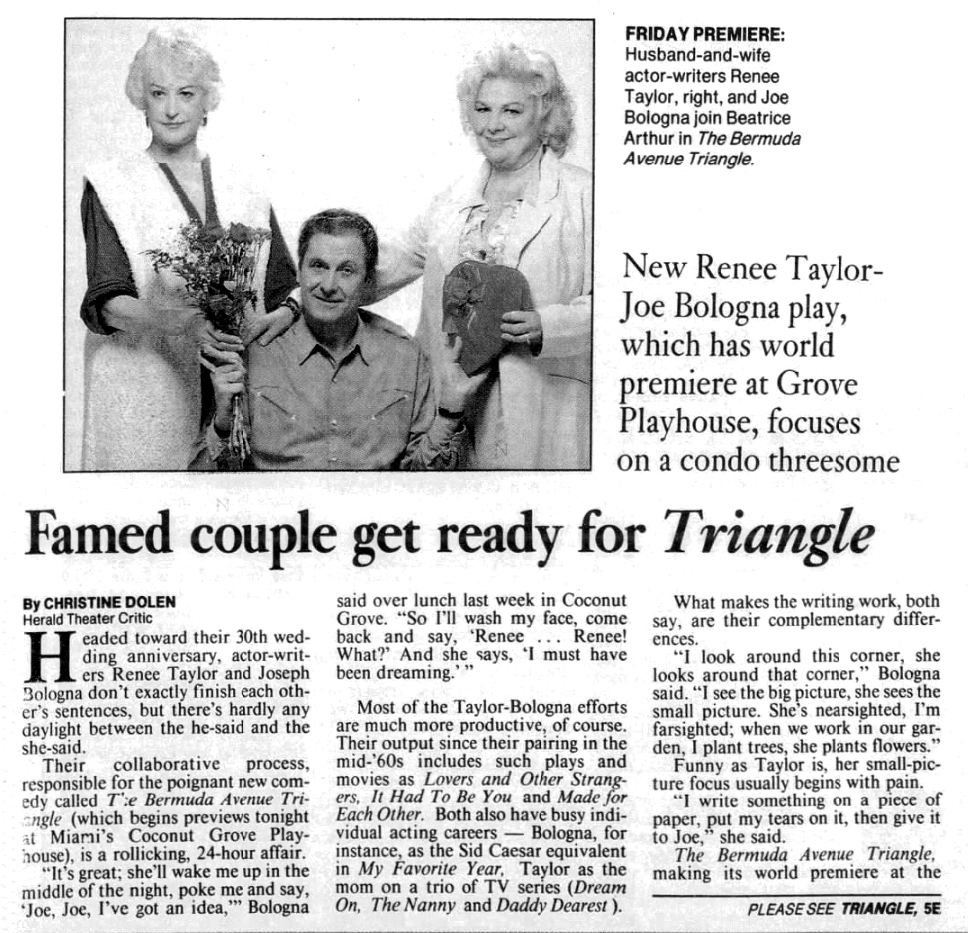
Bea Arthur starred in the 1995 production of Bermuda Avenue Triangle with Renee Taylor, and Joseph Bologna. The play, written by Taylor and Bologna, moved from CGP to Detroit, Los Angeles, and New York.

Eli Wallach received the Coconut Grove Playhouse Lifetime Achievement Award in1987. He starred in “Visiting Mr. Green,” which moved to an extended Off-Broadway run produced by Mr. Mittelman. The play has been performed all over the world in multiple languages.
Forty Playhouse productions in these years (world premieres, plays featuring some of the industry’s greatest theatrical talents, and plays supported by innovative partnerships between the not-for-profit and for-profit sectors) transferred directly to Broadway, Off-Broadway, London’s West End, toured, or went on to other national and international venues. They are:
- 1985 Corpse
- 1986 Rum & Coke
- 1986 On the Twentieth Century
- 1987 Alone Together
- 1987 Let ‘Em Rot
- 1988 Fame
- 1988 Blood Wedding
- 1988 Run for Your Wife
- 1988 Mixed Blessings
- 1989 Lady Day at Emerson’s Bar and Grill
- 1989 Matador
- 1990 Embraceable You
- 1990 Once Upon a Song
- 1991 The Big Love
- 1992 Tango Pasion
- 1992 Family Secrets
- 1994 Papa
- 1995 Bermuda Avenue Triangle
- 1995 Radio Gals
- 1995 Death of a Salesman
- 1996 Visiting Mr. Green
- 1996 Don’t Stop the Carnival
- 1997 Little by Little
- 1997 The Sunshine Boys
- 1998 An Evening with Jerry Herman
- 1998 Goodbye, My Friduchita
- 1999 Tallulah
- 1999 Rough Crossing
- 1999 The Gathering
- 2001 Say Goodnight, Gracie
- 2002 I’m Not Rappaport
- 2002 Urban Cowboy
- 2002 Blue
- 2003 Romeo and Bernadette
- 2003 Six Dance Lessons in Six Weeks
- 2003 Confessions of a Mormon Boy
- 2005 Tuesdays with Morrie
- 2006 Southern Comforts
- 2006 The Constant Wife
- 2006 Sonia Flew

Arnold Mittelman and Jimmy Buffett during the run of “Don’t Stop the Carnival.”
This body of work included three Pulitzer Prize-winning playwrights directing their work for the first time in a major theatrical production: Edward Albee (“Seascape”); David Auburn (“Proof”) and Nilo Cruz (“Anna in the Tropics”). Musical legends Cy Coleman, Charles Strouse, Jerry Herman, Jimmy Buffett, John Kander, and Robert Waldman were in residence at the Playhouse to develop world-premiere productions. Further, the Coconut Grove Playhouse was honored by the residence of librettist/writers Herman Wouk, Alfred Uhry, John Weidman, Terrence McNally, Fred Ebb, Luis Santeiro, and Mario Vargas Llosa.
The Playhouse recognized some of these major artists with Lifetime Achievement Awards, a program that Mittelman established in 1985 to recognize an individual’s achievement in theater generally and their involvement with the Coconut Grove Playhouse in particular. Those honored with this award were:
1985
George Abbott
author, director, producer
1986
Cy Coleman
composer
1986
Victor Borge
producer, musician
1987
Eli Wallach
actor
1987
Bobby Lewis
director, teacher
1989
Charles Strouse
composer, lyricist
1990
Chita Rivera
actor, singer, dancer
1990
Jose Ferrer
actor, director, producer
1991
Robert Whitehead
director, producer
1995
Julie Harris
actor
1997
Edward Albee
playwright
1998
Jerry Herman
composer, lyricist
1999
Tony Randall
actor, producer
1999
Jack Klugman
actor
2000
Theodore Bikel
actor
2001
Neil Simon
playwright
2004
Brian Murray
actor
2004
Hal Linden
actor
2005
Bea Arthur
actor
2006
Dick Van Dyke
ACTOR
Mittelman also established awards to recognize those who had made other types of contributions to the playhouse:
- The Spotlight Award to recognize citizens for their outstanding contribution to the cultural fabric of Miami-Dade County;
- The Making a Difference Award granted in conjunction with the Education Department, recognizing citizens contributing to the positive development of Miami-Dade County youth, specifically by taking action on the social problem portrayed in that year’s touring play; and
- The Community Award, honoring those who, in any number of ways, were supportive of the Playhouse.
Mittelman attributed the success of the productions to an outstanding in-house production staff (many of whom he inherited from Ferrer) in shops on and off site. In earlier eras, the Playhouse booked touring productions, but since the late 1970s almost all shows required building sets, locating props, designing and creating costumes, and planning sound and lights. The existence and quality of resident production personnel along with great stage managers is one of the main reasons the Playhouse was able to produce such a wide variety of work. Producers, directors and designers from commercial entities and other regional theaters wanted to work at CGP because they knew that even when budgets were tight, its staff would do everything needed to provide the best possible support for their plays . Listen to Mittelman’s reflections on the wonderful people he worked with during his 21 years at the Playhouse.
Arnold Mittelman on the Coconut Grove staff
One way in which Mittelman fostered staff and actor cohesion was by beginning the first rehearsal of every performance with a ritual: everyone involved in the work of that play – actors, support staff, production staff – gathered in a circle and introduced themselves, saying what role they had in making the production and the Playhouse successful. In this way, Mittelman reinforced his conviction that every person’s contribution was valued and that they all were part of a team. No understudies were ever hired or used in a production. When it was possible for Mittelman, given his other responsibilities, he directed plays— 17 during his career at the Playhouse. Listen to him reflect on how he enjoyed that opportunity.
Arnold Mittelman on Plays I Directed
While at the Playhouse he oversaw the creation of an education program that included an ongoing professionally taught theatrical training curriculum, internships, scholarships, and an in-school touring program that commissioned and produced 35 socially relevant plays reaching over 200,000 students and teachers. He created panel discussions and Q&A sessions with audiences following performances of many plays of social or historical relevance. Listen to Mittelman’s reflections about the Education program developed by Judith Delgado.
Arnold Mittelman on the Coconut Grove Education Department
Mittelman’s work was not limited to these programmatic activities. Not only did he handle the productions and guide the Education program, he also oversaw an ongoing and seasonal staff of 60-100 people that included artistic, production, marketing, fundraising, and administrative departments. Many of the production staff he inherited from Jose Ferrer stayed on for most of his tenure. He hired and relied on a senior staff of remarkable professionals supported by dedicated staff at every level, including volunteers. He also worked closely with the board on fundraising, renovations of the building, and long-term plans for it.
The Playhouse had numerous fundraising arms. Mittelman led a team that received $20 million in government funding and $5 million in private-sector support for emergency Playhouse renovations. He sought State funding, which increased throughout his tenure to reach a $500.000 yearly allocation in 1997. When disaster struck in 1992 with Hurricane Andrew, the Playhouse sought to recover part of $1.2M in lost revenue. It ultimately received $720,000 from the State, the largest share of the relief allocated for all cultural institutions.

One of the annual brochures describing Education Department offerings.
The Playhouse didn’t limit its fundraising efforts to major campaigns, though. To generate more revenue, Mittelman worked to increase subscriptions and single and group ticket sales. There were clever advertising campaigns as well as special programming, like the Rainbow Series, which sought to attract LGBT audiences with pre-show dining and discussion.
Annual galas, often recognizing the recipients of Lifetime Achievement Awards, were major events supported by individuals and corporate sponsors. In Gala journals it was common to see that many actors bought the most expensive pages for their messages of support
Artists who performed at the Playhouse had such feeling for it that many of them worked on its fundraising events. Liza Minnelli and Desi Arnaz, Jr. were two of the many actors who gave benefit performances.
In October 1998, during renovations to the theater’s Encore Room, contractors discovered corroded steel beams. Sea salt had eaten away the concrete and exposed the steel to corrosion. While there was no imminent danger, this unglamorous repair work was critically important. . Mittelman commenced a fundraising campaign in December.

Liza Minelli and Desi Arnaz, Jr. were two of the numerous actors who gave their time and resources to support the Playhouse.
By March 1999, Florida’s Secretary of State was planning to ask the Legislature for $2.5 million to pay for the extensive repairs and renovations needed. Meanwhile, the performers again supported the Playhouse. Cuban music stars Willy Chirino and Lisette Alvarez gave a benefit concert: “Rhythm to the Rescue.” These and other actors felt they were part of the Playhouse “family” and wanted the Playhouse to survive, so they offered their financial support.
The major capital campaign for the building restoration and future renovations was endorsed and supported by Edward Albee, Jean Stapleton, Charles Strouse, Eli Wallach and Anne Jackson, Bea Arthur, Mario Vargas Llosa, Theodore Bikel, and Tony Randall. Jack Klugman encouraged others to donate, and wrote:
When I started acting, fifty-five years ago, theatres like the Coconut Grove Playhouse were all over the country…I took them for granted… now they are practically gone…. that is why, more than ever, I appreciate the Coconut Grove Playhouse. It has become a rare gem that must be treasured. This theatre is run with care and concern, and if we let it disappear it will be a devastating loss for all of us… actors and audiences alike. I am pleading with you Floridians to support the Coconut Grove Playhouse and I will see you there for many years to come.
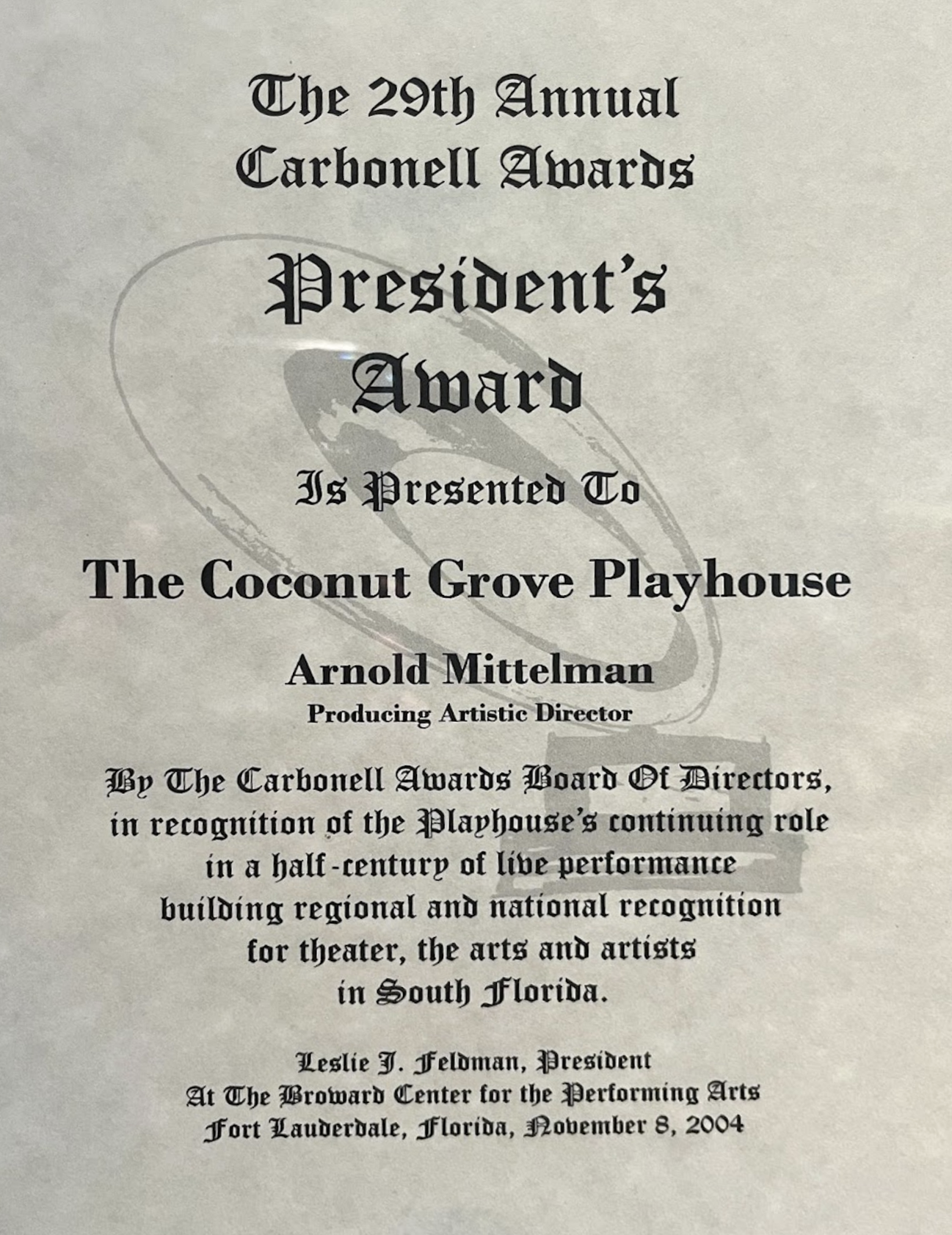
Carbonell President’s Award presented to the Playhouse.
In 2001 the Playhouse suffered a substantial financial blow: the State pulled its $500,000 annual support. This increased the urgency for further fundraising—not for capital funds, but for operating funds.
The Playhouse was honored by The Carbonell Awards, South Florida’s group that recognizes achievement in theatre and the arts. It received the President’s Award “in recognition of its continuing role in a half century of building regional and national recognition for theater, the arts and artists in South Florida.”
In 2004, the Playhouse embarked on yet another ambitious capital campaign–this time to finance the rebuilding of the theater and its property so it could better sustain itself in the future. The plans were to correct structural and infrastructure deficiencies, to restore the recently landmarked iconic theater facade, and to make more efficient use of the site by including multi-story parking and a scene shop.
By 2005, Mittelman had entered into an arrangement to move all the Coconut Grove Playhouse shows to the Parker Playhouse in Fort Lauderdale. Listen to Mittelman’s reflections on this challenging plan that would have enlarged the audiences and the donor base.
Arnold Mittelman on the Parker Playhouse

An ambitious capital campaign was launched in 2004 to fund Coconut Grove’s plan for the future of the historic building.
Neither of these plans – the rebuilding of the theater and its property, or moving shows to the Parker Playhouse – were able to be implemented.
On March 25, 2006, the Playhouse held its 50th anniversary gala. Listen to reflections on opening nights, galas and special events.
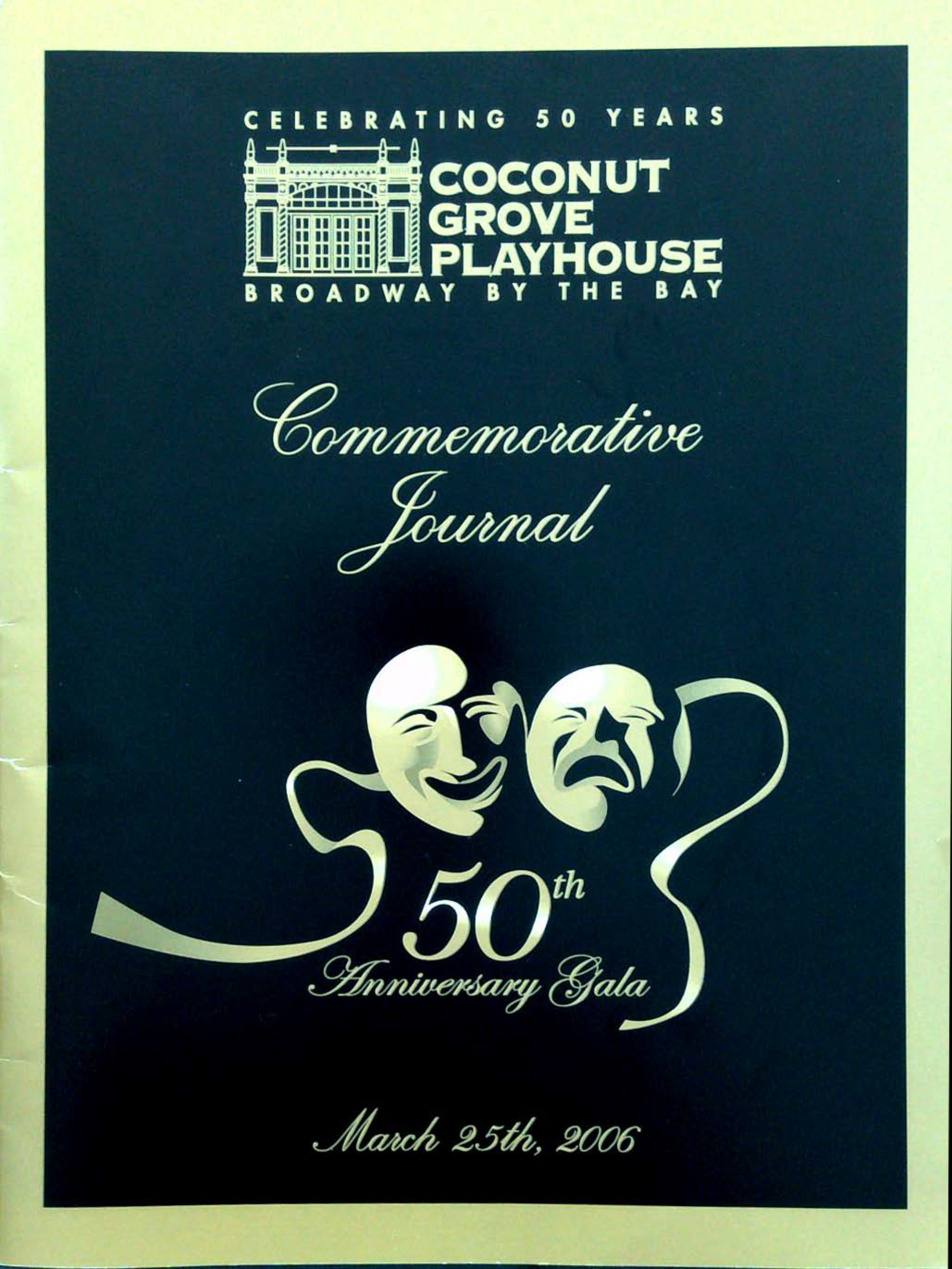
The 50th Anniversary Gala was held on March 25, 2006. Just 19 days later, the Playhouse closed its doors.
On April 10, 2006, Mittelman received the prestigious George Abbott Award for Outstanding Achievement in the Arts. Listen to his memories of “Mr.” Abbott.
Arnold Mittelman on the Mr. Abbott Award
On April 12, a sign posted on the door of the Playhouse read “Building is closed until further notice.” Board leaders stated they were concerned about the Playhouse’s finances. Nonetheless, Mittelman (who during his tenure was never on the board) was able to present his season’s final production, “Sonia Flew” by Melinda Lopez, starring Lucie Arnaz and directed by David Ellenstein.
As of 2025 the Playhouse remains closed. The not for profit board was dissolved. The State of Florida, Miami Dade County Government and Florida International University have assumed control of the building and its surrounding vacant land. For almost two decades, despite some community protests and legal disputes to the contrary, various officials and architects proposed development for the Playhouse site that would demolish the 1100-seat main auditorium and 200-seat Encore Room and replace them with one new 300-seat theater. This plan is currently seen as the best way to secure the future of the renowned Coconut Grove Playhouse.
In February 2007 Mittelman was named President and Producing Artistic Director of the National Jewish Theater Foundation. In 2012 he also became Founding Director of the National Jewish Theater Foundation – Holocaust Theater International Initiative at University of Miami.
In 2019 he received the Arts Champion Award from the John S. and James L. Knight Foundation, recognizing his lifetime arts achievements, including the leadership of the Coconut Grove Playhouse and the National Jewish Theater Foundation.
In 2020 Mittelman had the opportunity to reflect on his career with David Ellenstein, the well-known actor and theater artistic director. You can read this interview here. 2020_EllensteinConversationsMittelman
